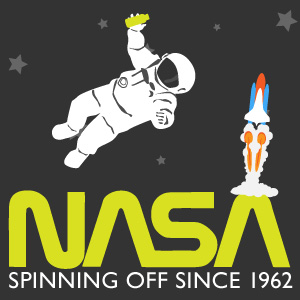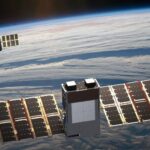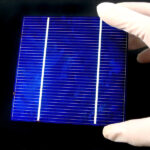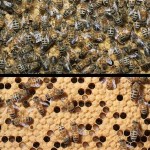September 16, 2014 – One of my readers shared the following infographic called NASA Spinning Off Since 1962. It highlights the inventions, discoveries and economic return on investment resulting from NASA. For every dollar invested by the government the American economy and other countries economies have seen $7 to $14 in new revenue, all from spinoffs and licensing arrangements. That amounts to in $17.6 billion current NASA dollars spent to an economic boost worth as much as $246.4 billion annually.
From the Black & Decker cordless vacuum, the Dustbuster, to ear thermometers and memory foam, we clean, check our temperature and get a good night sleep, here on Earth, on NASA-licensed spinoff technologies.
The winglet found on the wingtips of commercial aircraft today, an invention to reduce drag and improve fuel efficiency, came from NASA. Orthodontists use a translucent material called TPA for invisible braces – invented at NASA for an entirely different purpose. Farmers are using field sensors that tell them when their crops need watering – invented at NASA.
The list goes on and on.
Of course the downside to this argument is would the money spent elsewhere have yielded an equal if not greater return? Those who question NASA’s value point to the commercial spinoffs coming from research and technology investments through DARPA, the Defense Advanced Research Projects Agency.
DARPA’s annual budget today amounts to $2.8 billion USD, one-sixth NASA spending. DARPA inventions include a long list of pretty impressive commercial inventions and spinoffs. Here are the top 4 in my book – the Internet, GPS, 3D mapping, and virtual personal assistants like Siri in the Apple iPhone.
Of course DARPA technology didn’t deliver the first human to step on the Moon, and the International Space Station. And DARPA didn’t create the amazing technology that includes robotic rovers and spacecraft which send us pictures of Saturn’s astounding rings and moons, and desolate Martian landscapes. The investment in NASA may cost more but in my book it’s worth it.




















[…] the effectiveness of charities, I wouldn’t be that surprised if it didn’t. One example is the fact that for every dollar invested in NASA, there has been a $7-14 return on investment. If […]
How much does the US space program benefit the economy?
TLDR: ~$7-$14 per dollar spent (https://www.21stcentech.com/money-spent-nasa-waste/) There are quite a few ways the money spent on space benefits the US economy. To start with the people who work for NASA all spend the vast majority of the money they ea…
[…] Otoh, I’ve seen NASA ROI calculated anywhere from 5$ to 20$ per dollar spent. Hubbard places it at 8$. This article gives a good entry point to the topic https://www.21stcentech.com/money-spent-nasa-waste/ […]
[…] the effectiveness of charities, I wouldn’t be that surprised if it didn’t. One example is the fact that for every dollar invested in NASA, there has been a $7-14 return on investment. If […]
What is a dirty little (or big) secret about an industry that you have worked in, that people outside the industry really ought to know?
Studies show that due to licensing technology spinoffs NASA pays back much more than we spend on it. https://www.21stcentech.com/money-spent-nasa-waste/
[…] A two second Google search digs up a pretty awesome comparison article showing that for every $1 that’s invested in space exploration and space science we get a pretty decent return on investment. (Though I note that I can’t find the underlying studies that report the ROI, but the numbers quoted range from $7 to $14). I won’t settle on an actual number here since I can’t find any hard data, but you can get a general feel for how spending on getting us to space generates good spinoff technologies. […]
Was it compulsory for mankind to go to the moon just to collect some rock samples and waste billions of dollars? What was the profit?
It has been estimated that every dollar spent on the Apollo program resulted in a $14 return on that investment to the U.S. Economy. This would have been both in terms of spinoff technology but also in terms of the 400,000 people employed directly and…
[…] For every dollar spent on NASA there is an average 7 to 14 dollar ROI for other economies and industries due to innovations. Ref: https://www.21stcentech.com/money-spent-nasa-waste/ […]
I’d totally be careful of your URL’s I went to copy / paste it, and the display URL makes it seem like this article is about how much money is wasted on Nasa ” Money, Spent, Nasa, Waste” (https://www.21stcentech.com/money-spent-nasa-waste/)
Hi Chris, I’m trying to understand your comment. Which URL are you talking about? The posting includes an infographic that shows the ROI gained from NASA research. I also include two related articles, one describing NASA-inspired technology we use in our homes and lives every day, and another listing 20 things we have because of NASA.
Hi I’m referring to “https://www.21stcentech.com/money-spent-nasa-waste..”
when I pasted the URL to source a comment on Facebook, someone replied saying “oh, so that link states that “money-spent-nasa-waste” … does that mean money spent on nasa is a waste?
i told them it was just the URL and that the article is the opposite of that.
I see what you mean. I work in WordPress and I gather it created that contracted URL name that suggests the exact opposite of the article. You are right.
I have changed the URL to: https://www.21stcentech.com/money-spent-nasa-not-waste/
Thanks for pointing this out.
Len
[…] University, NASA has a 10:1 return rate on their spending, however some sites range it from 4:1 to 14:1. NASA currently employs 18,000 people, many of whom are scientists, engineers, and government […]
I have heard in popular literature, that sometime in the 1970s a study was done by the OMB or CBO that indicated our economy had received about seven dollars or so for every dollar we had invested in our space program up through most of Project Apollo.
Is there a link to this study or can it be downloaded? I would like to present it to those who claim money spent on space exploration is a waste.
Wikipedia references an MRIGlobal study from November 1971. There is a 1976 Chase Econometrics study. The only CBO study I have seen was done in the George W. Bush era. The references appear in the “Budget of NASA” posting in Wikipedia.
[…] space exploration. For every $1 invested in NASA by the US government the American economy has seen $7 to $14 in new revenue. This investment has also spurred technological development, for example breast cancer detection […]
[…] a report in 2014, for every dollar invested by the government, the American economy and other countries’ economies have seen $7 to $14 in new revenue, all from spinoffs and licensing arrangements. That amounts to $17.6 billion current NASA dollars […]